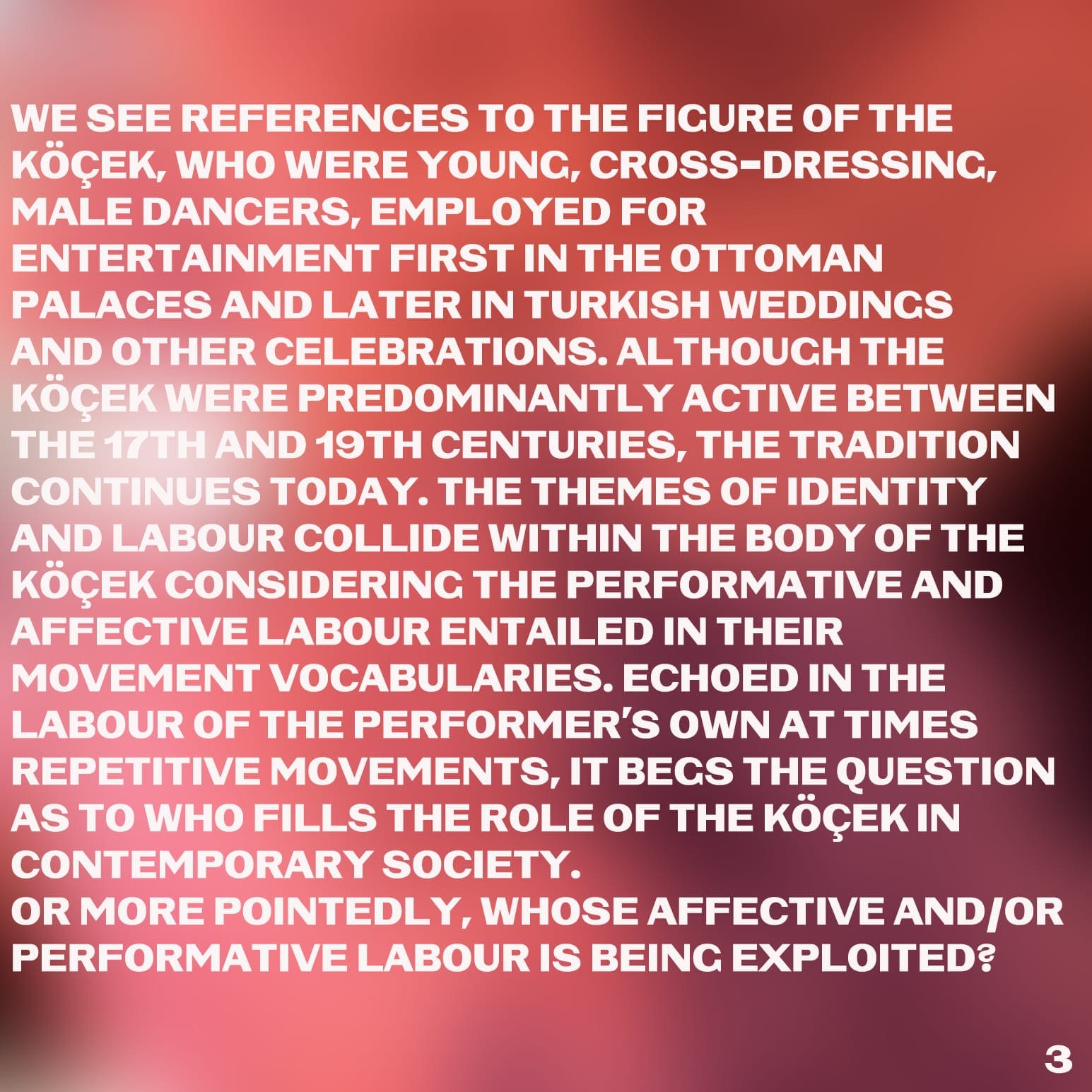karadeniz
Like much of choreographer and performer caner teker’s work, karadeniz, is autobiographical, yet it’s themes resonate far beyond the bounds of the artist’s experience. The piece’s namesake refers to the region in Turkey that teker’s family lived for many generations before immigrating to Germany as Gastarbeiterinnen (guest workers) in 1968.
Karadeniz can be seen as a departure point and like other references in the work, refuses to adhere to representational portrayal. The piece examines identity, labour and migration, collaging memories from the artist’s childhood from snippets of Turkish weddings with other remembered images and cultural signifiers, resulting in an assemblage of references that permeate every element of karadeniz. More than an identity marker, teker employs ‘queering’ as a methodology; blurring or eliminating boundaries, muddying distinctions or subverting expectations. Musical and choreographic influence is drawn from various regions of Turkey and its surrounding countries, respectfully challenging the notion of borders, while the migrant cast’s multi-tongued whispers can be heard throughout the score. Influences from teker’s experiences within queer club culture too are crucial to note, as the artist explores the body as a field for self-experimentation and the possibilities of transforming identities.
We see references to the figure of the köçek, who were young, cross-dressing, male dancers, employed for entertainment first in the Ottoman palaces and later in Turkish weddings and other celebrations predominantly between the 17th and 19th Centuries. The themes of identity and labour collide within the body of the köçek considering the performative and affective labour entailed in their movement vocabularies. Echoed in the labour of the performer’s own at times repetitive movements, it begs the question as to who fills the role of the köçek in contemporary society. Or more pointedly, whose affective and/or performative labour is being exploited?
The Turkish wedding was one of the artist’s first experiences of a “live event” — an event that had a ritualistic and performative character — and they recognised these staged moments as social choreographies, although one portending to the shackles of a hetero-normative existence. The allusion to this ceremony in karadeniz invokes a sense of dread, and asks us to sit with the complexity of all that weddings - and therefore the institution of marriage - entails for a queer subject. Although, more complex still is the ambivalence experienced when this is the reference one has to their culture. How to straddle the divide between queerness and cultural belonging? How to deal with the homelessness of living a (post-)migrant life, where neither culture fully accepts you as their own?
This piece of writing was comissioned by caner teker on the occasion of their performance of karadeniz in Düsseldorf in September 2021
Karadeniz can be seen as a departure point and like other references in the work, refuses to adhere to representational portrayal. The piece examines identity, labour and migration, collaging memories from the artist’s childhood from snippets of Turkish weddings with other remembered images and cultural signifiers, resulting in an assemblage of references that permeate every element of karadeniz. More than an identity marker, teker employs ‘queering’ as a methodology; blurring or eliminating boundaries, muddying distinctions or subverting expectations. Musical and choreographic influence is drawn from various regions of Turkey and its surrounding countries, respectfully challenging the notion of borders, while the migrant cast’s multi-tongued whispers can be heard throughout the score. Influences from teker’s experiences within queer club culture too are crucial to note, as the artist explores the body as a field for self-experimentation and the possibilities of transforming identities.
We see references to the figure of the köçek, who were young, cross-dressing, male dancers, employed for entertainment first in the Ottoman palaces and later in Turkish weddings and other celebrations predominantly between the 17th and 19th Centuries. The themes of identity and labour collide within the body of the köçek considering the performative and affective labour entailed in their movement vocabularies. Echoed in the labour of the performer’s own at times repetitive movements, it begs the question as to who fills the role of the köçek in contemporary society. Or more pointedly, whose affective and/or performative labour is being exploited?
The Turkish wedding was one of the artist’s first experiences of a “live event” — an event that had a ritualistic and performative character — and they recognised these staged moments as social choreographies, although one portending to the shackles of a hetero-normative existence. The allusion to this ceremony in karadeniz invokes a sense of dread, and asks us to sit with the complexity of all that weddings - and therefore the institution of marriage - entails for a queer subject. Although, more complex still is the ambivalence experienced when this is the reference one has to their culture. How to straddle the divide between queerness and cultural belonging? How to deal with the homelessness of living a (post-)migrant life, where neither culture fully accepts you as their own?
This piece of writing was comissioned by caner teker on the occasion of their performance of karadeniz in Düsseldorf in September 2021




